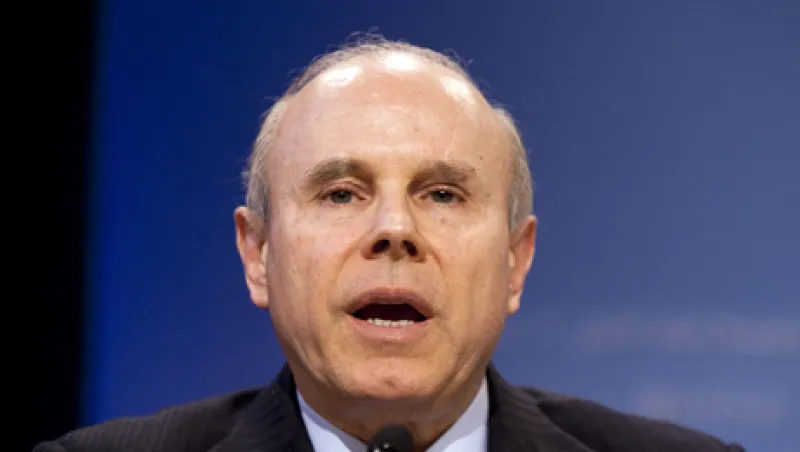Brazilian finance minister Guido Mantega shone a ray of hope amid Europe’s financial gloom a few weeks ago when he said his country and its fellow so-called BRICs -- Russia, India and China -- might step up purchases of European sovereign bonds to bolster faltering markets. With trillions of dollars in currency reserves, the BRICs could indeed raise demand for now-suspect European paper with subtle shifts in their investment weightings.
But any expectations for a reverse emerging markets bail-out of Old Europe were disappointed at the IMF/World Bank annual meetings this week in Washington. A packed joint press conference of the finance ministers and central bank governors from the four BRIC nations offered little save a tepid communique noting that the group was “open to consider, if necessary, providing support through the IMF or other international financial institutions in order to address the present challenges to global stability.”
Mantega himself, in a rambling opening comment for the assembled reporters, fell in line with the prevailing view that Europe’s problems are its own to solve. “European countries have to be quick and bold,” he said, contrasting their 2011 performance unfavorably with the coordinated global response to the calamities of 2008.
Multilateral officials also spoke out against the major emerging markets lending a hand to Europe at this stage. The BRICs should “focus on what they have to do at home,” World Bank President Robert Zoellick told reporters earlier today. That means essential reforms such as exchange rate adjustment in China, economic diversification in Russia, and attacking “structural barriers to growth” in India.
But beyond broad agreement to steer clear of solving Greece’s debt crisis, not-so-subtle differences emerged in the BRIC nations’ response to this second round of world economic crisis, and their underlying ambitions on the world economic stage. China and Brazil are staking out relatively activist positions. While Mantega retereated from his plan for coordinated BRIC bond purchases, President Dilma Rousseff said last week Brazil is “always ready to participate in any international effort” to avert financial catastrophe. An unnamed government official specified earlier this week that Brazil now backs a Plan B of supporting Europe via increased IMF contributions.
China similarly sees a “consensus to increase IMF resources,” finance minister Xie Xuren told the annual meeting press conference. “I think it will be discussed at these meetings,” he added. Separately, Yi Gang, deputy governor of China’s central bank, said his country could “do a lot at the margins” to bolster Europe once it puts its own credible rescue plan in place. Chinese foreign bond holdings are largely dictated by its own trade flows and sources of foreign direct investment, he said. Nonetheless, he hinted that the vast reserves might be subtly adjusted in Europe’s favor.
Russia, though the closest BRIC to Europe geographically, seemed the least interested in entanglement with its problems. Neither finance minister Alexei Kudrin nor central bank chairman Sergei Ignatiev even showed up for the BRIC press briefing. Deputy minister Sergei Storchak was detached. “We are trying to avoid words like aid, assistance and so on,” he said. “We will work with the Europeans.”
Indian central bank chief Duvvuri Subbarao indicated that the consensus to top up IMF funding does not necessarily include New Delhi. “It’s quite possible that the IMF’s resources are stretched, but there was no discussion of this question at the BRICs meeting today,” he said in Washington. “We have to measure any increased support for the fund with our own needs domestically.”
That the BRIC countries should differ in their financial diplomacy is hardly surprising. The BRIC concept was invented 10 years ago by an analyst at Goldman Sachs, and the four have little in common except large populations and, for the moment, healthy economic growth.






